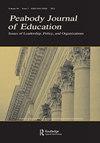新冠肺炎时期中学后教育的主观价值:来自全国代表性小组的证据
Q2 Social Sciences
引用次数: 0
摘要
COVID-19大流行几乎影响了美国生活的方方面面。它扰乱了教育和就业,并可能改变了未来学生心目中就业和高等教育之间的取舍。这场大流行病可能特别扰乱了传统上得不到充分服务的高等教育学生的教育轨迹,例如那些来自低收入和/或种族少数背景的学生,他们往往在攻读学位的同时工作。如果大流行影响了当前和潜在学生对高等教育的主观价值(相对于其往往不菲的成本),则可能影响了他们入学的愿望。这些影响可能会对高等教育的入学和成绩产生持久的影响,因此是必要的考虑因素。我们使用“了解美国研究”(一个具有全国代表性的美国家庭小组)的数据提供了这种影响的暗示性证据。使用多层(家庭内的受访者)有序逻辑模型,我们发现大流行增加了非白人受访者对高等教育的主观评价,相对于白人受访者,相对于东北部和中西部的南部和西部受访者,以及随着时间的推移,有高等教育学生的家庭。我们没有发现大流行导致的家庭收入水平在高等教育主观价值方面存在差异的证据。本文章由计算机程序翻译,如有差异,请以英文原文为准。
The Subjective Value of Postsecondary Education in the Time of COVID: Evidence from a Nationally Representative Panel
ABSTRACT The COVID-19 pandemic has affected virtually all aspects of US life. It has disrupted education and employment and may have shifted the trade-off between employment and higher education in prospective students’ minds. The pandemic may have especially disrupted the educational trajectories of traditionally underserved postsecondary students, such as those from low-income and/or racially minoritized backgrounds, who often work while pursuing their degrees. If the pandemic has affected current and potential students’ subjective value of postsecondary education relative to its often-substantial costs, it may have affected their aspirations to enroll. Such effects may have lasting impacts on postsecondary enrollment and attainment, so are essential considerations. We provide suggestive evidence of such effects using data from the Understanding America Study, a nationally representative panel of US households. Using multilevel (respondent within household) ordered logistic models, we find that the pandemic has increased the subjective valuation of postsecondary education for non-white respondents relative to white respondents, for respondents in the South and West relative to the Northeast and Midwest, and over time for households with postsecondary students. We find no evidence for pandemic-driven differences in the subjective value of postsecondary education by household income level.
求助全文
通过发布文献求助,成功后即可免费获取论文全文。
去求助
来源期刊

Peabody Journal of Education
Social Sciences-Education
CiteScore
2.20
自引率
0.00%
发文量
43
期刊介绍:
Peabody Journal of Education (PJE) publishes quarterly symposia in the broad area of education, including but not limited to topics related to formal institutions serving students in early childhood, pre-school, primary, elementary, intermediate, secondary, post-secondary, and tertiary education. The scope of the journal includes special kinds of educational institutions, such as those providing vocational training or the schooling for students with disabilities. PJE also welcomes manuscript submissions that concentrate on informal education dynamics, those outside the immediate framework of institutions, and education matters that are important to nations outside the United States.
 求助内容:
求助内容: 应助结果提醒方式:
应助结果提醒方式:


